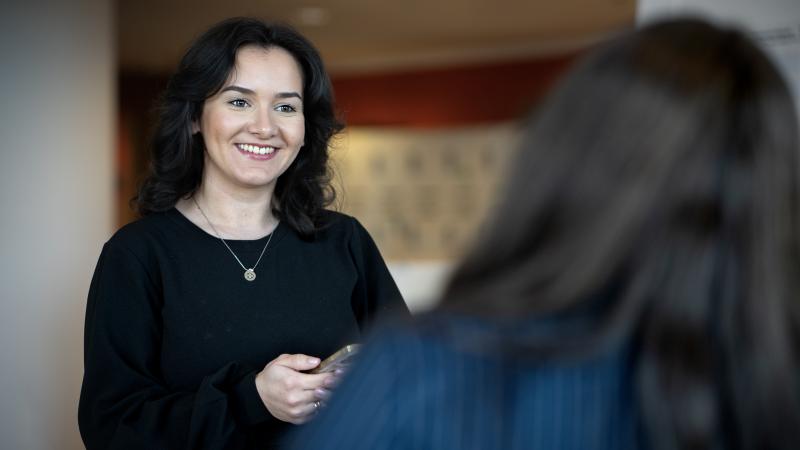The story of Deborah, senior employee DJO
‘Our team is a necessary link that completes the chain’ Deborah has noticed that a lot of people who once left the Immigration and Naturalisation Service (…

I had so many questions and wanted to know what was really going on there.
The Knowledge and Talent Unit processes applications by international students, employees and entrepreneurs who contribute to our economy through their knowledge and innovations. As a decision staff member, Salome is mostly responsible for enforcement. ‘My work begins when an applicant no longer meets the requirements of the residence permit. For example if there have been changes in income or if someone has changed jobs. In addition, I check whether organisations meet their requirements for “recognised sponsorship” and its legal obligations.’
It was not particularly likely that Salome would end up with the IND. After all, her experience as a child was not great. ‘I was 10 years old when I came to the Netherlands from Georgia. At that age, you are really aware of what’s going on around you: new country, new language, new culture. That’s overpowering. The IND sent a lot of letters, always with a negative answer. And because I was learning Dutch in school, I looked at these letters and translated them for my parents. As a child, you don’t understand. I thought, “Why am I not good enough? What’s Wrong with me?” It made me insecure and angry. I had very many questions.’
This feeling of incomprehension did not go away. Therefore, Salome decided to dive deeper into Dutch law. She studied law at Utrecht University of Applied Sciences and did a 10-month traineeship with the Highly Skilled and Talent Unit of the IND. ‘I then thought: this is my chance. Finally I can have a look inside the IND and see what is really going on there.’
And this other side was a pleasant surprise. ‘I had already been able to put my picture of the IND into perspective because of what I learned during my programme, but once inside I had a complete turnaround,’ Salome tells. ‘I was welcomed by a team of kind, warm colleagues who took every application seriously and treated it with great care. They weren’t bogeymen at all. I can now put the lack of understanding of the past better into perspective: I have found peace. For me, the circle is now complete.’
After her traineeship, Salome was happy to stay with the Highly Skilled and Talent Unit. In her role as decision staff member, she mostly checks whether highly skilled migrants still meet the requirements and whether organisations are fulfilling their obligations. And she enforces this. ‘If I receive a signal that someone no longer meets the requirements, I first send the person a letter of intent. This is a letter saying that I intend to withdraw the permit and why. Someone can then respond to it; this is called an opinion. So, the person on the other side can always tell their story. And I listen to it. Using the opinion, I then make a final decision. I can, for example, issue a warning or impose a fine, or withdraw the permit.’
Salome allows for applicants’ personal accounts in her work. ‘Of course I must abide by the law. There are rules and I must follow them. Moreover, we must be on the alert for persons or organisations which want to abuse the law. But what I like about the IND is that we do not treat all violations equally strict. We take measures appropriate for the situation and take human errors into account. It’s nice that I’m given the possibility here to listen to the personal account. For me, this is very important: not everything is black and white.’
‘And of course it remains difficult,’ Salome continues. ‘There are times when you really feel for the person on the other side, but have no other option than to withdraw the permit. Sometimes, someone then reacts very emotionally. They have built a whole life here; the children are going to school here. This touches me. These moments briefly remind me of what I went through myself. If that happens, I talk about it with colleagues. And I take my time to explain my decision clearly and so that people can understand it. If necessary, I will do it three or four times. It’s the least you can offer.’
For the time being, Salome is not finished working for the IND. ‘This organisation is at the centre of public interest. And I am allowed to contribute to it. Later, I would like to do this on a strategic level. I have the ambition to grow towards management: setting targets, thinking about the road we are taking. I am given opportunities to develop myself further at the IND. What’s more: I’m even being encouraged. What do you want to learn? Which steps do you want to take? Go and find out!’
‘Our team is a necessary link that completes the chain’ Deborah has noticed that a lot of people who once left the Immigration and Naturalisation Service (…

‘My contact with the candidates is personal and unique’ Has a vacancy remained unfilled for months? Or is a job difficult to carry out? Then Fatih comes…
‘Privacy is a right, not a privilege' Nowadays, personal data can be easily misused. With merely a profile picture from social media,…